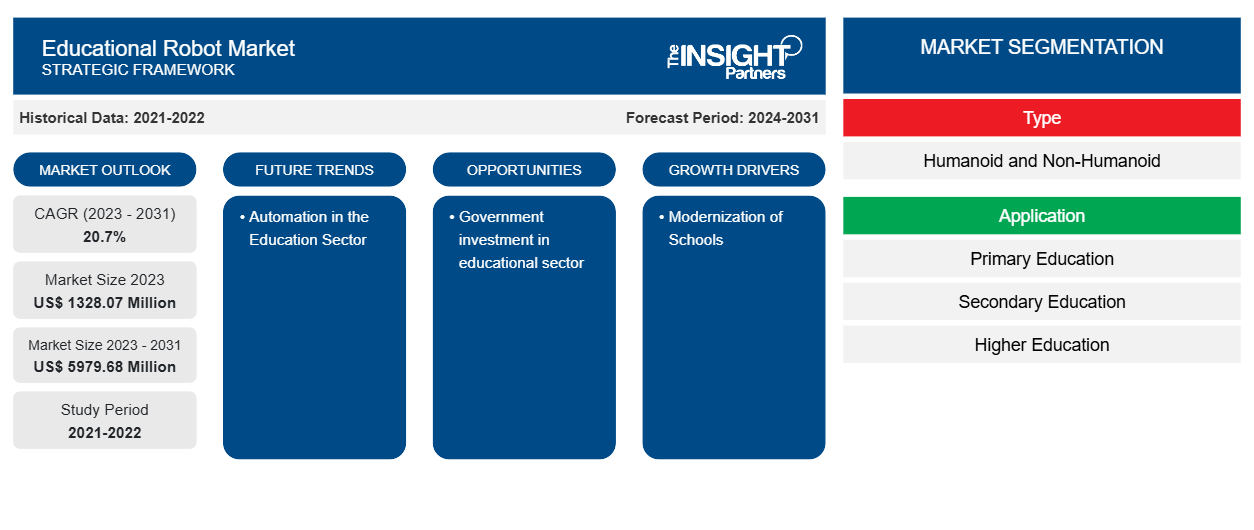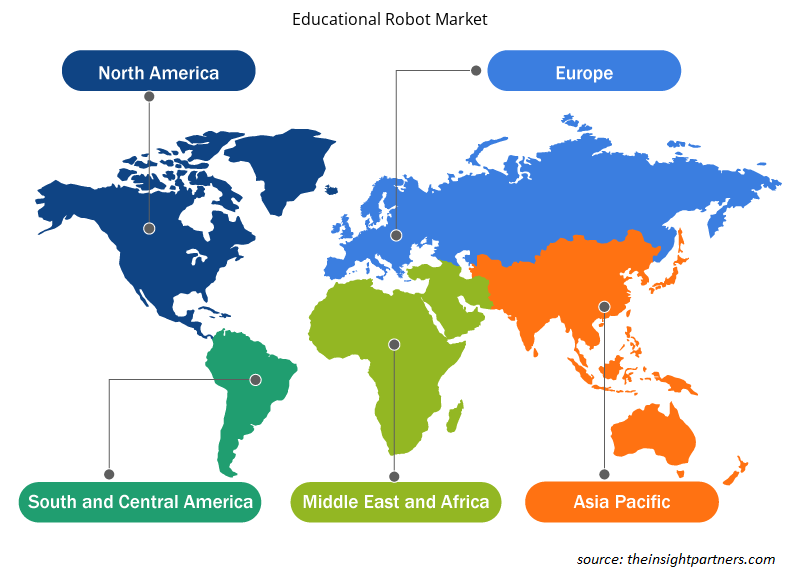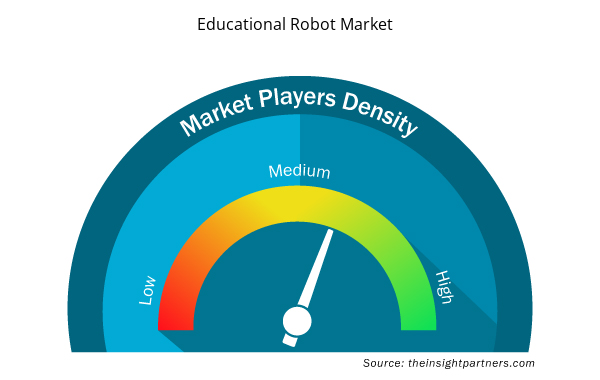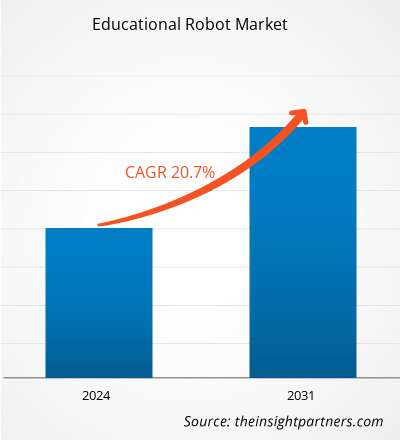The educational robot market is projected to reach US$ 5979.68 million by 2031 from US$ 1328.07 million in 2023. The market is expected to register a CAGR of 20.7% during 2023–2031. The government investment in robotics and automation in the education sector are likely to remain key trends in the market.
Educational Robot Market Analysis
The rising focus on enhancing science, technology, engineering, and mathematics (STEM) is driving the market growth. The investments in the education system by the government authorities further foster market growth. Schools and colleges are including various aspects of robotics which propels the market growth.
Educational Robot Market Overview
Educational robots are programmable robots that enable students of all ages to deepen their knowledge of robotics and programming. In addition, it helps them learn other cognitive skills. It provides students with everything they need to build and program a robot that can perform a variety of tasks.
Customize This Report To Suit Your Requirement
You will get customization on any report - free of charge - including parts of this report, or country-level analysis, Excel Data pack, as well as avail great offers and discounts for start-ups & universities
Educational Robot Market: Strategic Insights

- Get Top Key Market Trends of this report.This FREE sample will include data analysis, ranging from market trends to estimates and forecasts.
Customize This Report To Suit Your Requirement
You will get customization on any report - free of charge - including parts of this report, or country-level analysis, Excel Data pack, as well as avail great offers and discounts for start-ups & universities
Educational Robot Market: Strategic Insights

- Get Top Key Market Trends of this report.This FREE sample will include data analysis, ranging from market trends to estimates and forecasts.
Educational Robot Market Drivers and Opportunities
Modernization of Schools
The government is heavily investing in the education sector to modernize the schools and colleges and further enhance the learning of the students. These investments are encouraging the market players to provide their educational robots in schools, which is driving the market growth. For example, in April 2022, Denmark's Shape Robotics said that it had signed an agreement with local peer KUBO Robots to distribute educational robots to schools in Romania.
Automation in the Education Sector
ABB's 2023 global survey of 2,301 education professionals discovered that 80 percent believe robots and automation will shape the future of employment over the next ten years. The use of robots in the educational system and teaching programs. Industrial robot market players are focused on launching robots in the education sector which can fuel the educational robot market in the future.
Educational Robot Market Report Segmentation Analysis
Key segments that contributed to the derivation of the educational robot market analysis are type and application.
- Based on the type, the educational robot market is segmented into humanoid and non-humanoid. The non-humanoid segment held the largest share of the market in 2023.
- By application, the market is segmented into primary education, secondary education, higher education, and others. The other segment held a significant share of the market in 2023.
Educational Robot Market Share Analysis by Geography
The geographic scope of the educational robot market report is mainly divided into five regions: North America, Asia Pacific, Europe, Middle East & Africa, and South & Central America.
Asia Pacific region is expected to grow with the highest CAGR during the forecast period. The region is focused on technological advancement in the educational sector. The rising investment in the educational sector complements the market growth. The introduction of robots in schools further drives the market growth in the region. For example, in March 2024, a Kerala school introduced the country’s first AI Teacher, Iris to take an innovative step towards education. Iris was created in partnership with Makerlabs Edutech and is the state's and probably the nation's first humanoid robot teacher. Iris is capable of answering intricate queries across various subjects, offering individualized voice support, and promoting interactive educational opportunities. In addition, Iris is equipped with wheels to increase mobility.
Educational Robot Market Regional Insights
The regional trends and factors influencing the Educational Robot Market throughout the forecast period have been thoroughly explained by the analysts at Insight Partners. This section also discusses Educational Robot Market segments and geography across North America, Europe, Asia Pacific, Middle East and Africa, and South and Central America.

- Get the Regional Specific Data for Educational Robot Market
Educational Robot Market Report Scope
| Report Attribute | Details |
|---|---|
| Market size in 2023 | US$ 1328.07 Million |
| Market Size by 2031 | US$ 5979.68 Million |
| Global CAGR (2023 - 2031) | 20.7% |
| Historical Data | 2021-2022 |
| Forecast period | 2024-2031 |
| Segments Covered |
By Type
|
| Regions and Countries Covered | North America
|
| Market leaders and key company profiles |
Educational Robot Market Players Density: Understanding Its Impact on Business Dynamics
The Educational Robot Market market is growing rapidly, driven by increasing end-user demand due to factors such as evolving consumer preferences, technological advancements, and greater awareness of the product's benefits. As demand rises, businesses are expanding their offerings, innovating to meet consumer needs, and capitalizing on emerging trends, which further fuels market growth.
Market players density refers to the distribution of firms or companies operating within a particular market or industry. It indicates how many competitors (market players) are present in a given market space relative to its size or total market value.
Major Companies operating in the Educational Robot Market are:
- Aisoy Robotics
- Hanson Robotics Limited
- Modular Robotics
- PAL Robotics
- FANUC America Corporation
- Sanbot Innovation Technology Ltd
Disclaimer: The companies listed above are not ranked in any particular order.

- Get the Educational Robot Market top key players overview
Educational Robot Market News and Recent Developments
The educational robot market is evaluated by gathering qualitative and quantitative data post primary and secondary research, which includes important corporate publications, association data, and databases. A few of the developments in the educational robot market are listed below:
- ABB Robotics expanded its education offering with the launch of the IRB 1090. The 1090 industrial education robot, authenticated by the globally recognized education institute STEM.org, is designed to upskill students and provide them with a competitive advantage in securing employment. The new education robot forms a key part of ABB’s wider education offering, which includes additional industrial robots, as well as education packages, next-generation controllers, and market-leading programming and simulation software. (Source: ABB Robotics, Press Release, September 2023)
- MatataStudio, a digital learning solution provider with innovation and originality at its core, launched a new educational robot kit called "VinciBot", aiming to combine computer science, artificial intelligence, and education entertainingly. High-tech concepts such as (AI) and machine learning (ML) are introduced into primary school classrooms. These robotics kits are not only highly educational but also incorporate programming, computational thinking, creativity, and exploration. The design concept of MatataStudio is to encourage children to master the basic knowledge of programming and computer science by building and operating robots with their own hands while cultivating their innovative thinking and problem-solving abilities. (Source: MatataStudio, Press Release, February 2024)
Educational Robot Market Report Coverage and Deliverables
The "Educational Robot Market Size and Forecast (2021–2031)" report provides a detailed analysis of the market covering below areas:
- Educational robot market size and forecast at global, regional, and country levels for all the key market segments covered under the scope
- Educational robot market trends, as well as market dynamics such as drivers, restraints, and key opportunities
- Detailed PEST/Porter's Five Forces and SWOT analysis
- Educational robot market analysis covering key market trends, global and regional framework, major players, regulations, and recent market developments
- Industry landscape and competition analysis covering market concentration, heat map analysis, prominent players, and recent developments in the educational robot market
- Detailed company profiles
- Historical Analysis (2 Years), Base Year, Forecast (7 Years) with CAGR
- PEST and SWOT Analysis
- Market Size Value / Volume - Global, Regional, Country
- Industry and Competitive Landscape
- Excel Dataset



Report Coverage
Revenue forecast, Company Analysis, Industry landscape, Growth factors, and Trends

Segment Covered
Type and Application

Regional Scope
North America, Europe, Asia Pacific, Middle East & Africa, South & Central America

Country Scope
Argentina, Australia, Brazil, Canada, China, France, Germany, India, Indonesia, Italy, Japan, Malaysia, Mexico, Russian Federation, Saudi Arabia, Singapore, South Africa, South Korea, United Arab Emirates, United Kingdom, United States
Frequently Asked Questions
The estimated value of the educational robot market will be US$ 5979.68 million by 2031.
Aisoy Robotics; Hanson Robotics Limited; Modular Robotics; PAL Robotics; FANUC America Corporation; Sanbot Innovation Technology Ltd.; Life & Science, Inc.; iRobot Education; Softbank Robotics Group Corp.; and Lego System A/S are some of the key players operating in the educational robot market.
The government investment in robotics and the need for cognitive skills in kids are the key driving factors impacting the educational robot market.
Automation in the education sector is considered a key trend in the online exam-proctoring market.
The global educational robot market is estimated to register a CAGR of 20.7% during the forecast period 2023–2031.

 Get Free Sample For
Get Free Sample For